Friday, 20 February 2026
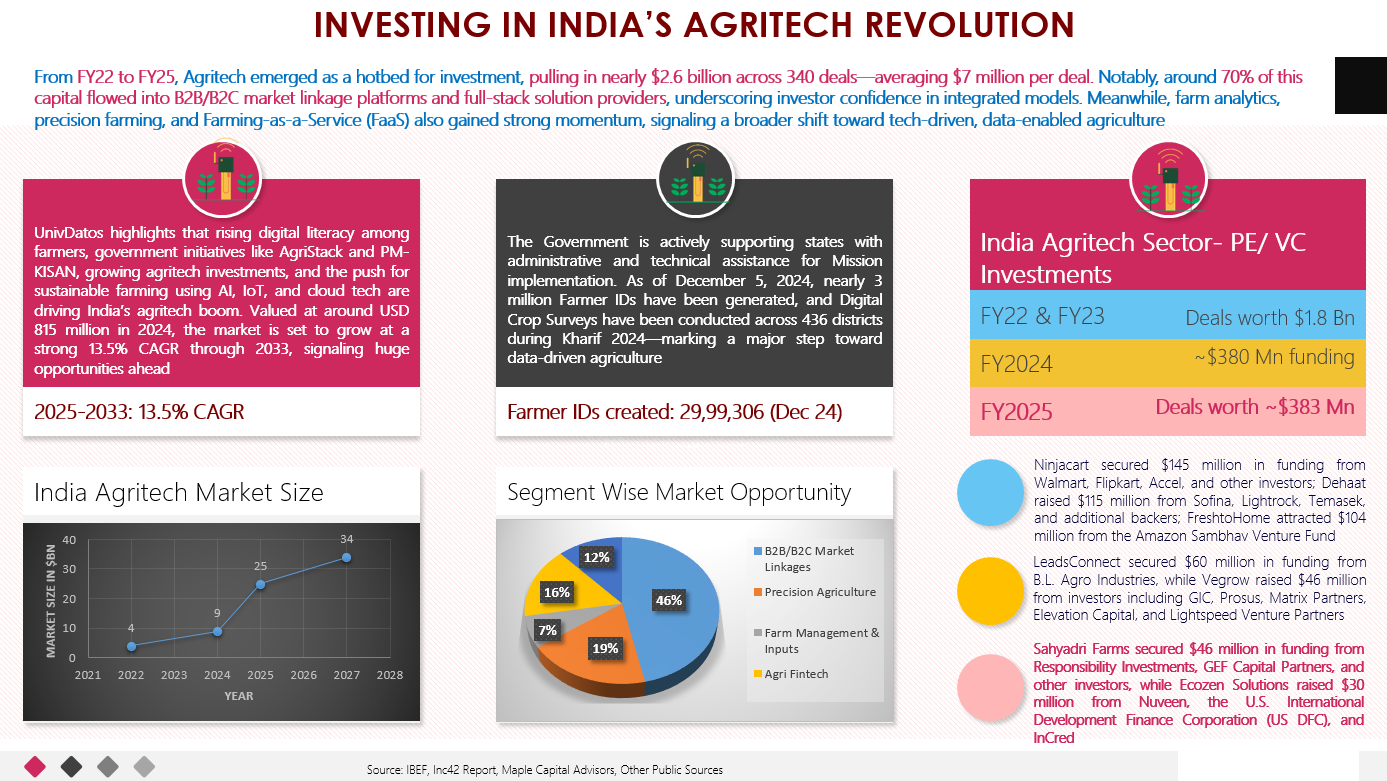
India’s farmlands are undergoing a quiet revolution—powered by tech, backed by policy, and driven by purpose. With agriculture employing 45 per cent of the workforce and contributing 18 per cent to GDP, the rise of agritech could unlock a $95 billion GDP boost through smarter yields, lower costs, and climate resilience. From drone-powered soil checks to AI-driven advisories, platforms like AgriStack and eNAM are turning farming into a precision, data-led industry. Over $2.6 billion in startup funding since FY22 signals that agritech isn’t just innovation—it’s India’s next growth engine. With the right investments and inclusive digital tools, India can lead the world in climate-smart, tech-forward farming.
India’s rich agro-ecological diversity has long established it as a global agricultural leader. Agriculture continues to be a vital pillar of the Indian economy, contributing nearly 18 per cent to GDP and employing about 45 per cent of the country’s workforce, according to Redseer Strategy Consultants. Even during the upheaval of the COVID-19 pandemic, agriculture stood out as a pillar of stability and resilience. This was largely enabled by targeted government interventions, including strong support for farmer producer organisations (FPOs), promotion of crop diversification, improvements in agricultural productivity, encouragement of mechanisation, and enhanced financial support mechanisms.
A key milestone in this effort was the launch of the Rs 1 lakh crore Agriculture Infrastructure Fund, designed to strengthen rural infrastructure, improve post-harvest logistics, and build a more resilient agri-economy. Despite its agricultural output, India ranks only eighth globally in agricultural exports, holding a 2.33 per cent share of the global market. However, with the rise of agritech innovations, the sector is on the brink of a major shift.
A recent Ernst & Young report estimates that India’s agritech market holds a $24 billion opportunity, yet current penetration remains low at just 1.5 per cent. If fully developed, the agritech ecosystem could increase farmers’ incomes by 25 per cent to 35 per cent, contributing up to $95 billion to GDP through enhanced productivity, reduced input costs, improved market access, and diversified income streams. In response, the integration of climate-resilient practices with agricultural innovation has emerged as a critical strategy to safeguard both food and energy security.
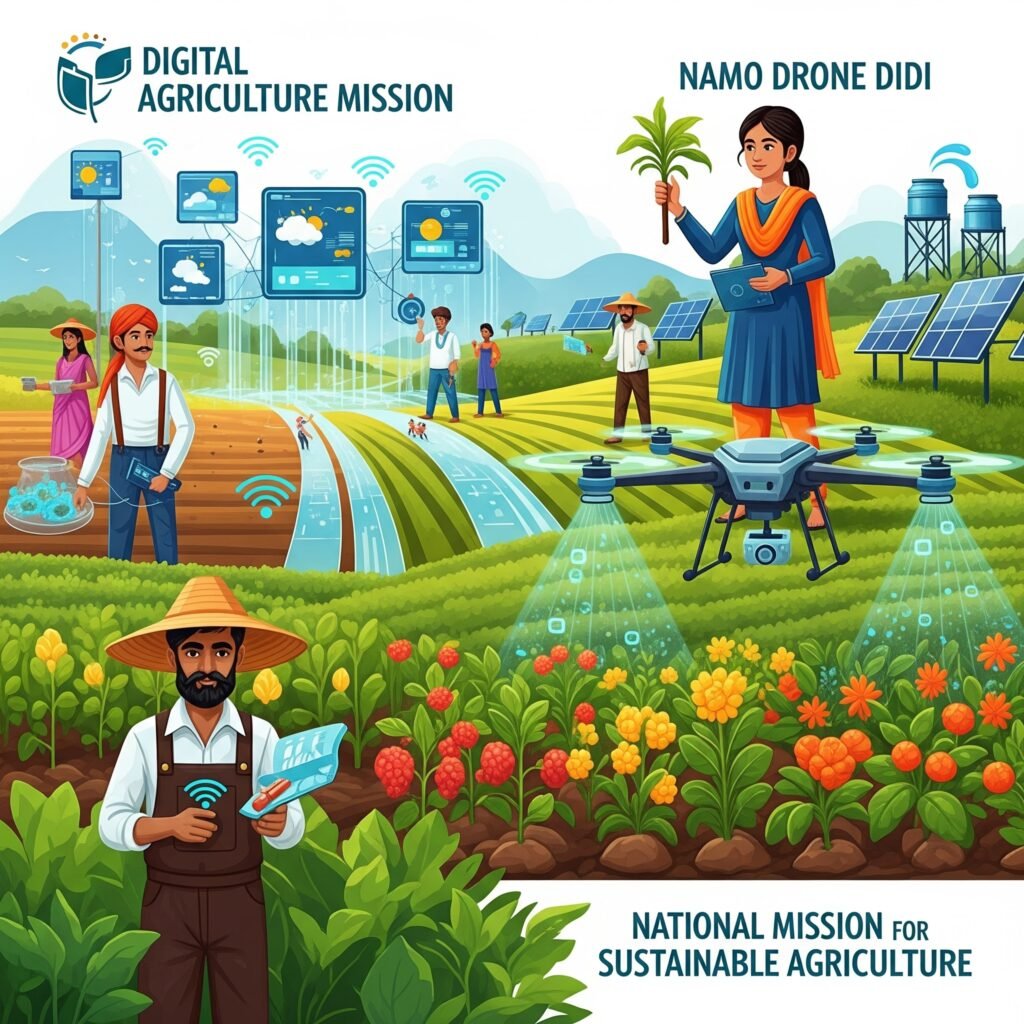
India’s agricultural future hinges on its ability to adapt and innovate. By merging traditional knowledge with cutting-edge technologies and fostering an ecosystem that supports resilience, India can not only protect its farmers but also lead the way in sustainable, climate-smart agriculture. With the right investments and policies, the country can build a farming system that is productive, equitable, and climate-ready, securing food and fuel for generations to come.
India’s agritech sector is undergoing a seismic shift. Powered by digital innovation and growing investor interest, it’s reshaping the future of farming—from the ground up. Since FY22, the sector has pulled in over $2.6 billion across 340 deals, with nearly 70 per cent of funding flowing into B2B/B2C market linkages and full-stack platforms. The message from investors is clear: Agritech is no longer a niche—it’s a commercial opportunity with national impact.
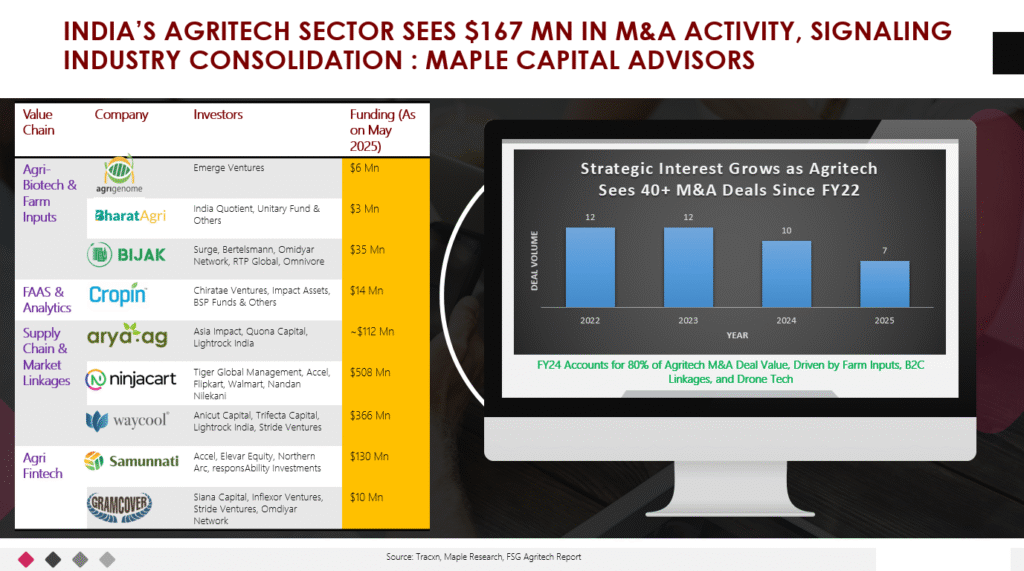
India is making significant strides in reshaping its agricultural landscape by integrating digital innovation and sustainability into the heart of farming. Initiatives like the Digital Agriculture Mission, with an allocation of Rs 2817 crore, are equipping farmers with real-time data and decision-making tools that improve productivity and resource efficiency.
The Centre has allocated Rs 1,261 crore for the Namo Drone Didi scheme for 2023-26, bringing a much-needed gender lens to agriculture by empowering women through self-help groups, turning them into active participants and entrepreneurs in the supply chain.
The National Mission for Sustainable Agriculture (NMSA) further strengthens the ecosystem by promoting environmentally friendly farming practices. To bolster domestic manufacturing of drones and related components, the government is planning the PLI Scheme 2.0 worth Rs 1000 crore. Together, these initiatives are laying the foundation for a more resilient and inclusive agricultural sector—one that is better equipped to tackle both current pressures and future demands.
Centralised digital platforms can help streamline stakeholder coordination and enhance service delivery. At the same time, innovative financing models, such as micro-credit schemes and blended finance, are essential to unlock investments in agri-tech solutions. Just as crucial is the need for training and capacity building, ensuring that farmers not only have access to technology but also the confidence and skills to use it effectively.
Agri-tech holds the key to revitalising Indian agriculture, offering solutions that increase yields, reduce environmental impact, and improve livelihoods, especially in the face of mounting climate risks. By embracing innovation at scale, India can make meaningful progress toward the Sustainable Development Goals (SDGs) and its national commitments under global climate agreements. With the right vision and collective effort, India can not only transform its agricultural sector but also emerge as a global leader in climate-smart farming, demonstrating how technology and inclusive growth can shape a sustainable future.
Where Technology Meets the Tiller
A quiet revolution is reshaping India’s farmlands — and technology is leading the charge. Across the country, agritech startups are blooming, tackling age-old farming challenges with modern solutions. Driving this growth is strong government support. Initiatives like Startup India have created a fertile environment for innovation, giving entrepreneurs the tools and confidence to break new ground in the agritech space. Agritech is doing more than just streamlining farm operations — it’s reshaping the entire agricultural value chain.
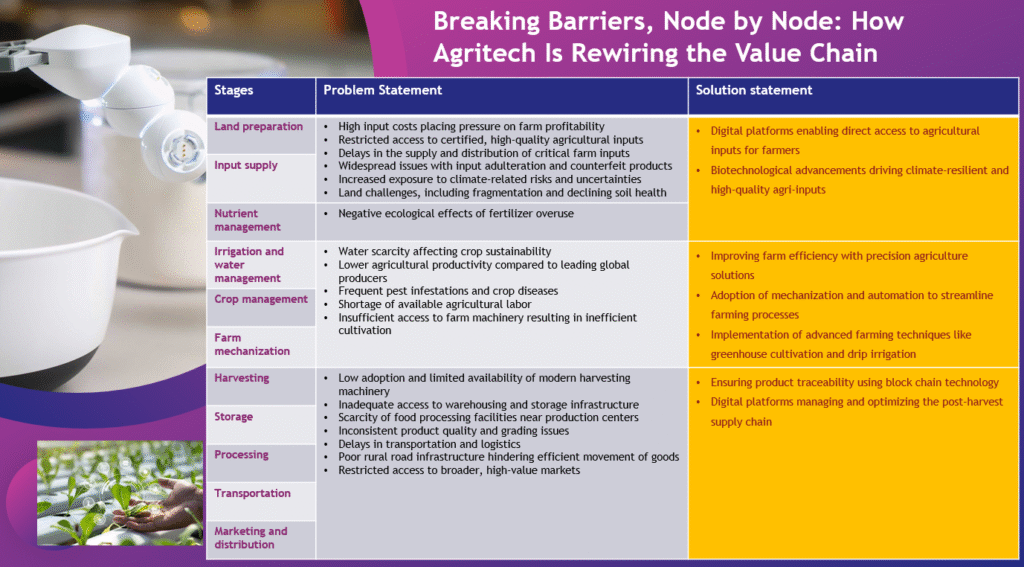
By harnessing tools like AI, machine learning, data analytics, and SaaS platforms, farmers are making better decisions faster. These technologies enable smarter resource use, reduce operational costs, and help maximise yields — all while preparing farms to withstand climate challenges. In short, agritech is turning agriculture into a data-driven, climate-smart industry — and the benefits are just beginning to unfold. Private equity and venture capital firms are pouring capital into the sector, providing startups with the resources they need to refine their operations, boost research and development, and expand into new markets. The outcome: A fresh wave of tech-powered agriculture that’s smarter, more sustainable, and perfectly tuned to the needs of today’s farmers.
Policy Meets Precision: India’s AgriTech Leap
The fusion of technology and agriculture is opening up powerful new pathways to tackle the growing risks posed by climate change. In India, the government is playing a proactive role in driving this transformation. A cornerstone of this effort is the Agri-Stack — a digital infrastructure designed to unify agricultural services and data on a single platform. This initiative makes it easier for farmers to access everything from advisories and subsidies to credit and insurance, while also streamlining coordination across the entire agricultural value chain. By improving access to cutting-edge technologies and offering financial and policy support, India is steadily building an agri-tech ecosystem that empowers farmers to boost productivity while embracing sustainable practices.
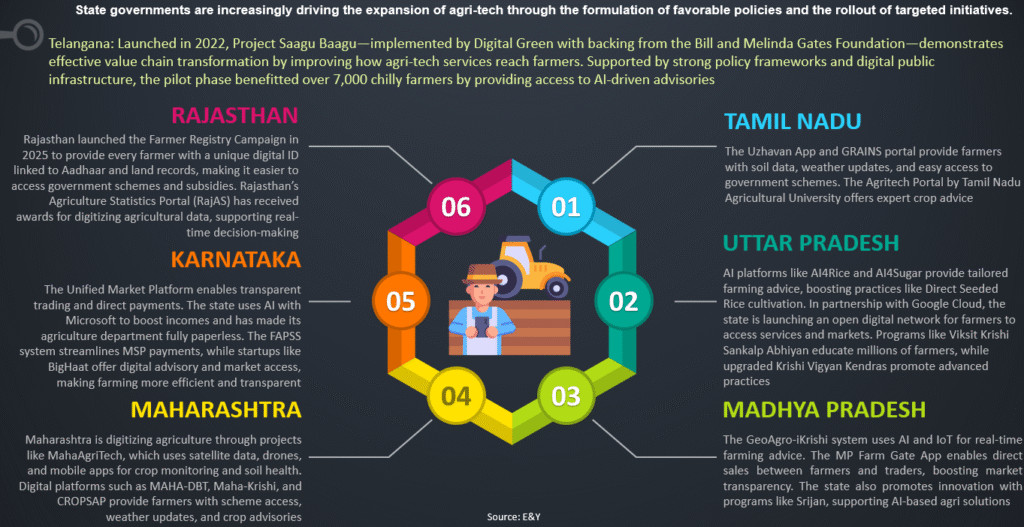
Among the most impactful steps taken by the Indian government to modernise agriculture are initiatives like the Agricultural Accelerator Fund and the creation of Digital Public Infrastructure for Agriculture. These forward-looking programmes are designed to energise India’s fast-growing AgriTech ecosystem and promote innovation that can withstand future disruptions and challenges.
Among the most groundbreaking initiatives by the Indian government in recent years is AgriStack, formally called the India Digital Ecosystem of Agriculture (IDEA). This bold vision seeks to weave together the country’s vast agricultural data into a single, powerful platform, anchored by each farmer’s land records. In a nation where most farmers cultivate small plots with limited resources and little exposure to cutting-edge technology, AgriStack holds the promise of being a true game-changer. This ecosystem integrates an impressive array of digital innovations, transforming the way decisions are made on the ground:
First, Drone-powered soil and crop assessments that provide precise insights to optimise pesticide use and promote eco-friendly farming.
Second, tailored recommendations crafted for every unique plot of land—offering advice on the best seeds to sow, optimal farming techniques, and smart soil management practices
Third, Instant, real-time updates on weather, crop insurance options, market trends, and government programs, all designed to reduce risks and improve farmers’ livelihoods. By delivering these actionable insights straight to farmers’ fingertips, AgriStack has the potential to revolutionise agriculture across India, empowering millions to make informed, timely decisions that enhance both productivity and resilience.
A key pillar of India’s AgriTech transformation is the National Agriculture Market (eNAM)—a comprehensive electronic trading platform that seamlessly integrates existing Agriculture Produce Market Committee (APMC) mandis across the country. By bridging the information gap between buyers and sellers, eNAM introduces much-needed transparency and efficiency into agricultural markets. This digital marketplace unifies national trade, enabling farmers to access fair prices in real time based on actual supply and demand. The outcome? Farmers gain stronger bargaining power, markets operate more smoothly, and consumers benefit from access to high-quality produce.
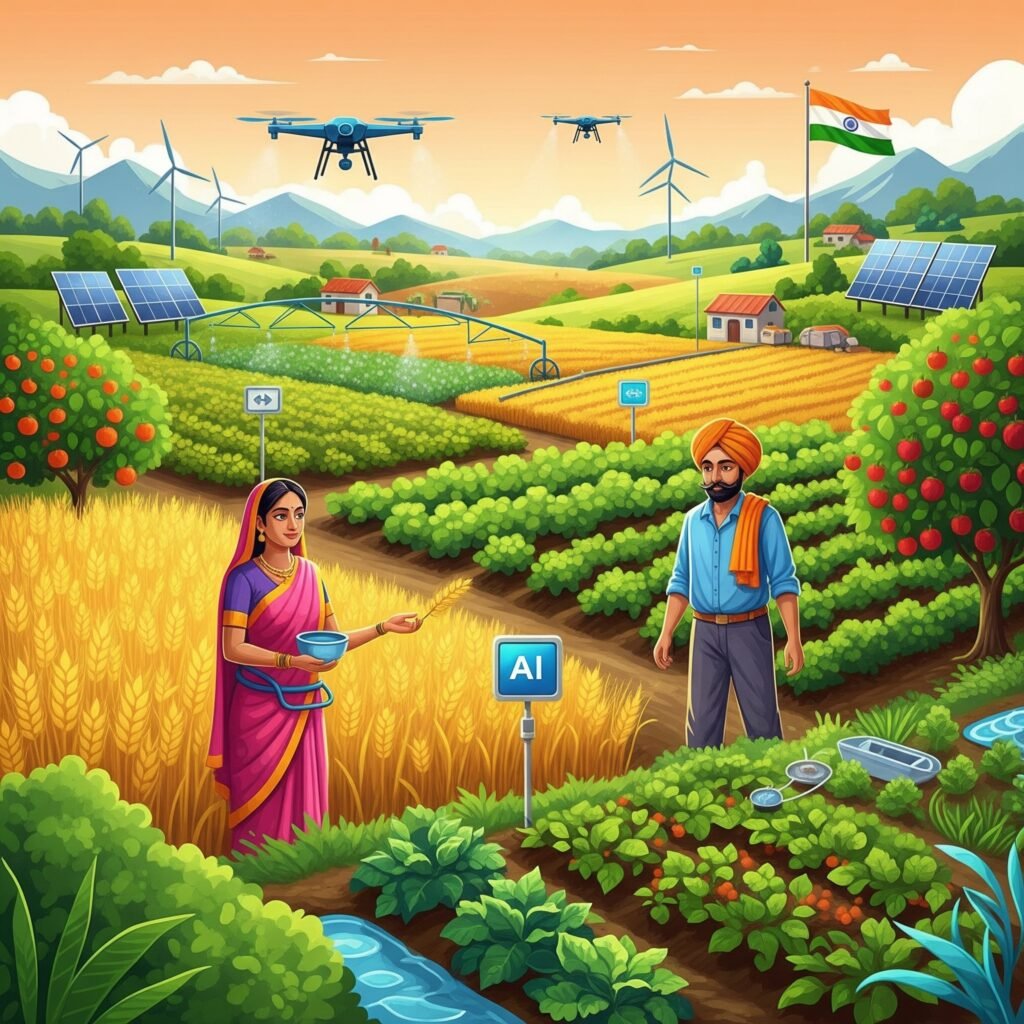
In the 2022-23 Union Budget, the government launched the Agriculture Accelerator Fund, a visionary initiative aimed at energising rural entrepreneurs and startups driving innovation in agriculture. This fund supports the development of affordable, technology-based solutions tailored to overcome persistent challenges faced by farmers. By empowering young “Agri-preneurs” with funding and resources, the initiative is poised to boost productivity and foster a dynamic AgriTech ecosystem nationwide. Supporting these efforts is the plan to establish a Digital Public Infrastructure for Agriculture—an open-source, interoperable platform designed around six farmer-focused services. These services include crop planning, health management, easier access to inputs, credit and insurance support, market insights, and the promotion of AgriTech startups.
A shining example of this vision is the government’s Digital Soil Health Card initiative. By analysing soil quality and composition, the programme promotes precision farming tailored to local conditions. The revamped Soil Health Card portal, accessible via web and mobile app, provides farmers with easy-to-understand reports—complete with emoticons indicating soil health—in 22 languages and five dialects, ensuring broad accessibility and inclusivity. At the same time, the government is turbocharging India’s AgriTech scene by actively backing agri-incubators and start-ups.
Programmes like RKVY-RAFTAR and the Agri-Sure Fund are providing crucial funding, expert guidance, and resources to nurture promising early-stage ventures and build a thriving innovation ecosystem. This support is fuelling breakthroughs in precision farming and cutting-edge technologies that boost both productivity and climate resilience. Initiatives such as the Pradhan Mantri Krishi Sinchai Yojana are pushing efficient irrigation solutions to conserve water, while the use of drones and other smart tools highlights a bold commitment to sustainable, resource-savvy agriculture. Together, these efforts are reshaping Indian farming—making it smarter, greener, and ready to face the challenges of tomorrow.
Invest Integrate Innovate
To effectively drive agri-tech integration, several strategic actions are essential.
First, modernising agri-incubators is crucial. This involves updating their infrastructure and programmes to align with rapidly evolving technologies and changing market demands.

Second, establishing state-level, controlled testing grounds where innovators can pilot their technologies in real-world agricultural environments is necessary. These testing sites enable developers to rigorously evaluate the effectiveness and practicality of their solutions while ensuring compliance with regulatory standards.
Third, the development of an integrated digital platform is key to creating a cohesive agri-tech ecosystem. For farmers, it would offer easy access to timely advisories, best practices for sustainable farming, and direct links to market opportunities, empowering them to make data-driven decisions that improve productivity and income.
Fourth, significant investment must be channelled into precision farming and climate-smart technologies. These advanced tools and methods enhance farmers’ ability to respond to environmental challenges such as erratic weather, water scarcity, and soil degradation.
Finally, deploying a diverse range of financial instruments is vital to accelerate the growth and adoption of promising agri-tech ventures. This includes fast-track credit facilities to provide startups with quick access to capital, risk-sharing frameworks that encourage investment by mitigating potential losses, and impact investments focused on generating social and environmental benefits alongside financial returns.
By implementing these comprehensive measures, the integration of agri-tech can be significantly accelerated, fostering a more sustainable, productive, and resilient agricultural sector that benefits all stakeholders involved.
India stands at the threshold of a new agricultural era—one where sustainable growth and climate resilience go hand in hand. By embracing agri-tech innovations, the country can make significant strides toward achieving global environmental goals, reducing greenhouse gas emissions and safeguarding farmers from climate uncertainties.
——— Suchetana Choudhury (suchetana.choudhuri@agrospectrumindia.com)